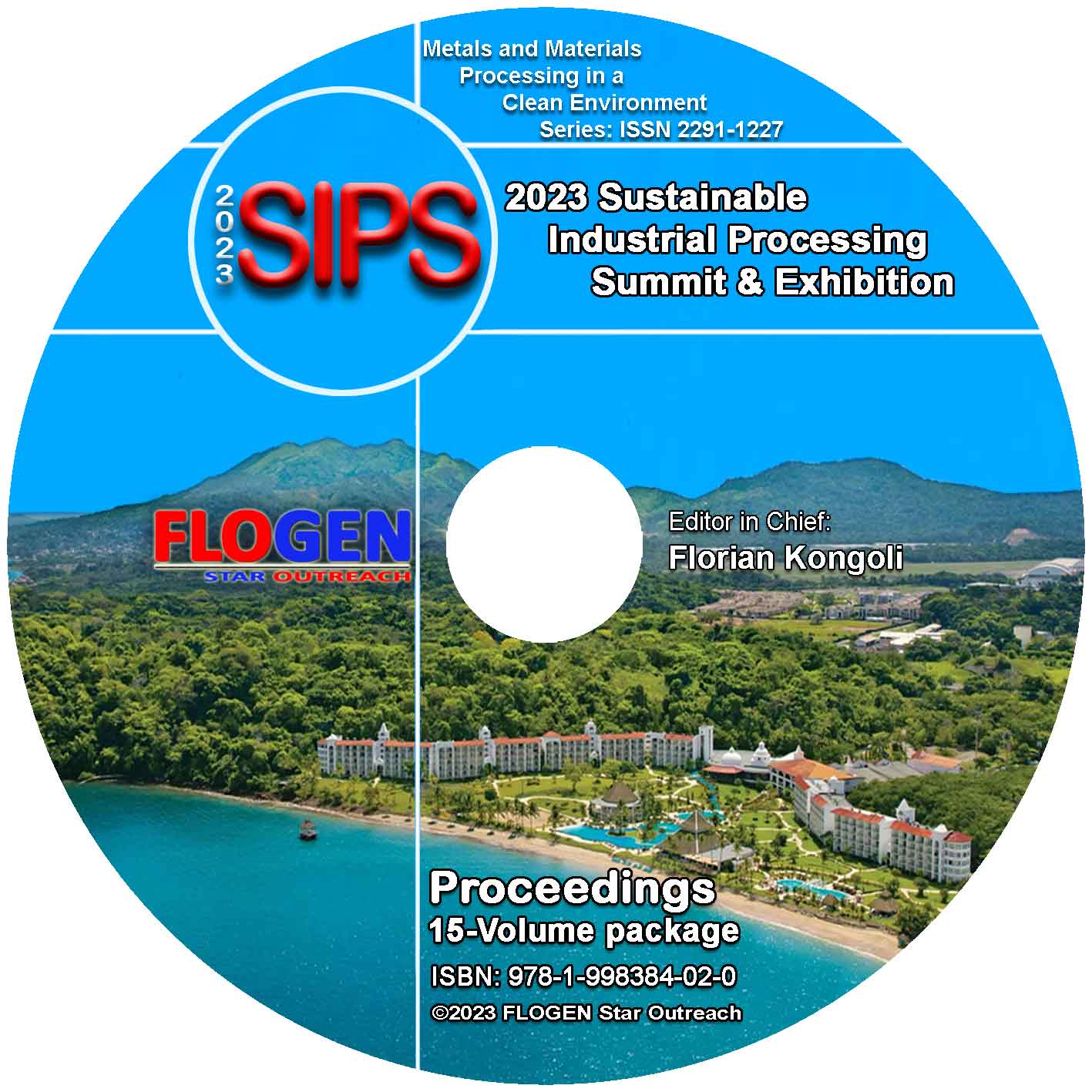2023-Sustainable Industrial Processing Summit
SIPS2023 Volume 1. Assis Intl. Symp/ Advanced Iron & Steel Making
| Editors: | F. Kongoli, T. Usui, R.A. Vilela, J. A. de Castro, W. F. Santos, J. Poveromo, GS. Mahobia, B. Deo |
| Publisher: | Flogen Star OUTREACH |
| Publication Year: | 2023 |
| Pages: | 441 pages |
| ISBN: | 978-1-989820-72-8 (CD) |
| ISSN: | 2291-1227 (Metals and Materials Processing in a Clean Environment Series) |

CD shopping page
ALTERNATIVE SLURRY TREATMENT (LANDFILL LEACHATE), A PERSPECTIVE ON SUSTAINABLE DEVELOPMENT (1)
Marcia Ribeiro1; Paulo Assis2; Jorge Murta3; Marcelo Esteves Campos4;1, Caetanópolis, Brazil; 2UFOP, OURO PRETO, Ouro Preto, Brazil; 3FEDERAL UNIVERSITY OF OURO PRETO, Ouro Preto, Brazil; 4UFMG, Belo Horizonte, Brazil;
Type of Paper: Regular
Id Paper: 56
Topic: 2
Abstract:
One of the biggest contaminants of soil, groundwater and surface water - leachate - also called percolated liquid, is the result of the enzymatic action of microorganisms and products resulting from the degradation of waste and water infiltration in landfills. This can prejudice the health of the population nearby the area. This study aimed to evaluate the implementation of a leachate treatment method (liquid from the decomposition of waste landfilled in the municipality of Conselheiro Lafaiete, Minas Gerais) with a focus on cost reduction and environmental improvement. The study was carried out during two years in Ouro Preto. We had studied a huge number of bibliographical references that portrayed about microwaves, alternative treatment of slurry and various subjects about it. Then, a composite sample was collected from the stabilization pond (inlet) and a composite sample from the output pond. The collection was carried out at three different points of the exit and entrance lagoon of the Sanitary Landfill in Conselheiro Lafaiete. Experiments were carried out with microwaves, organic coagulants and vertiver grass after treatment of manure in microwaves. The following parameters were analyzed: pH, BOD5, COD, Nitrate, Total Solids, Total Nitrogen, Phosphorus and Dissolved Oxygen, Total Aluminum, Total Lead, Total Copper, Total Chromium, Total Nickel, Total Zinc, Total Iron and Manganese, before and after the alternative slurry treatment. Among the results presented in this work, vetiver grass (Vetiveria zizanioides), when cultivated in a hydroponic system, is a plant with possible potential for phytoremediation of leachate leachate.
Keywords:
CO2; Microwave; Sustainability; Technology;References:
EHRIG, H. J. Quality and Quantity of Sanitary Landfill Leachate. Waste Management & Research I, p. 53-68. 1989.M. Strous, J.G. Kuenen, M.S. Jetten, Key physiology of anaerobic ammonium oxidation, Appl. Environ. Microbiol. 65 (1999) 3248–3250 (accessed October 25, 2017), http://www.ncbi.nlm.nih.gov/pubmed/10388731
M. Strous, J.G. Kuenen, M.S. Jetten, Key physiology of anaerobic ammonium oxidation, Appl. Environ. Microbiol. 65 (1999) 3248–3250 (accessed October 25, 2017), http://www.ncbi.nlm.nih.gov/pubmed/10388731.
M. Umar, H.A. Aziz, M.S. Yusoff, Trends in the use of Fenton, electro-Fenton and photo-Fenton for the treatment of landfill leachate, Waste Manage. 30 (2010) 2113–2121, http://dx.doi.org/10.1016/j.wasman.2010.07.003.
K.A. Third, A.O. Sliekers, J.G. Kuenen, M.S. Jetten, The CANON system (Completely Autotrophic Nitrogen-removal Over Nitrite) under ammonium limitation: interaction and competition between three groups of bacteria, Syst. Appl. Microbiol. 24 (2001) 588–596, http://dx.doi.org/10.1078/0723-2020-00077.